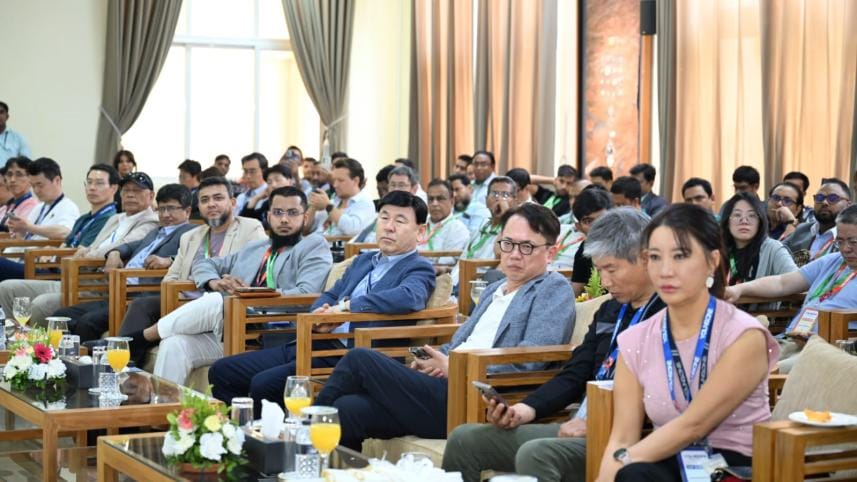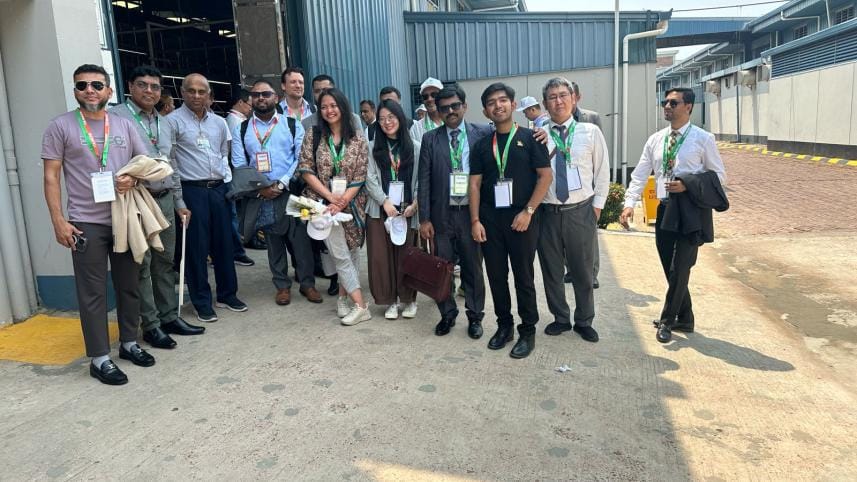Govt goes big to woo global investors

The four-day Bangladesh Investment Summit 2025 kicked off yesterday with the view to shining a spotlight on the country's evolving investment landscape to global investors.
As part of the summit, a 60-member delegation from 25 countries was shown the Korean Export Processing Zone (KEPZ) and National Special Economic Zone to showcase the manufacturing facilities in the country.
Kihak Sung, chairman of Youngone Corporation, which manages KEPZ, said that as a private organisation, it can move very quickly.
"We are accountable only to our management, not constrained by multiple layers of bureaucracy. This makes our operations more efficient," he said.
He also cited a successful partnership with a global storage company, where Youngone built facilities at its own cost to accommodate the investor, in an example of proactive investment facilitation that built long-term business ties.
Looking ahead, Sung emphasised the need for joint efforts between the government, financial institutions, and private enterprises to expand value-added exports, especially in the apparel sector.
He expressed confidence that Bangladesh could outperform regional competitors in attracting and retaining foreign investment.
After visiting the EPZs in Chattogram, Yasser Amit, chairman and chief executive officer of Evision Group and ImatrixUSA Inc, expressed strong interest in investing in renewable energy and semiconductors in Bangladesh.
"We are exploring solar and power projects in several economic zones. We also see great potential in developing the semiconductor industry here provided there is robust infrastructure and supportive policy," said Amit, a New York-based non-resident Bangladeshi.
Kaniz, director of marketing development at China State Construction, expressed interest in Bangladesh's progress, citing the success of existing foreign ventures.
She plans to report back to her headquarters but acknowledged that final investment decisions would take time. She also flagged the need for more clarity on utility and infrastructure services.
The low labour costs are an attractive proposition, said Kevin Wu of Mega Rich Industries (HK).
Jack He, managing director of MYSKY, praised Bangladesh's affordable labour market, but he remained undecided due to limited knowledge about long-term business prospects and foreign investment regulations.

Addressing the delegation, Abdulla Al Faruque, project director of the National Special Economic Zone (NSEZ), outlined the benefits offered by the Bangladesh Economic Zones Authority, including land allocation, tax holidays and full profit repatriation.
He highlighted the NSEZ's strategic location across Mirsarai, Sitakunda and Sonagazi, covering 33,800 acres with strong road, port, and air connectivity.
BEZA's one-stop service centre currently offers 60 online services to ease the process of setting up and operating businesses, Faruque said, adding that the zone is targeting industries such as garments, steel, leather, electronics and agro-processing.
Over at Intercontinental Dhaka, there were three sessions to highlight the country's start-up ecosystem in a programme titled "Bangladesh Startup Connect". About 1,500 delegates attended the sessions.
The government is creating an ecosystem to make business operations in Bangladesh much easier, said Chowdhury Ashik Mahmud Bin Harun, executive chairman of the Bangladesh Investment Development Authority (BIDA).
"What we need to probably continue to focus on as an investment promotion agency of the government is how we create that bridge between the assets we have in the country and the potential liquidity that is available globally," he said at the opening session.
Not just cheap and trainable labourers, Bangladesh's utility services are cheaper than in Vietnam, Cambodia, Thailand and Indonesia, he said.
BIDA is not expecting investments straight away since the summit has been organised to build confidence among investors.
"Sometimes investors express interest, but until the investment is delivered, there is no bridge between the government and the investors, resulting in low confidence among them," Ashik said.
"We will keep track of all of them individually," he added.
There were three start-up investment announcements on the first day, said Faiz Ahmad Taiyab, special assistant to the chief adviser for the ICT Division.
The first announcement was made by Incepta, which will invest $1 million through youth summits and universities as either equity finance, grants or loans.
Besides, the Bangladesh Bank has announced two funds of Tk 800 crore and Tk 400 crore for start-ups, he said, adding that the central bank has been adopting a policy that will remove the obstacles for accessing funds by start-ups.
In addition, there was a positive note on mobilising funds from the budgetary support of JICA as a fund of funds -- an investment vehicle that holds shares in other funds rather than in individual securities or private assets.



 For all latest news, follow The Daily Star's Google News channel.
For all latest news, follow The Daily Star's Google News channel.
Comments